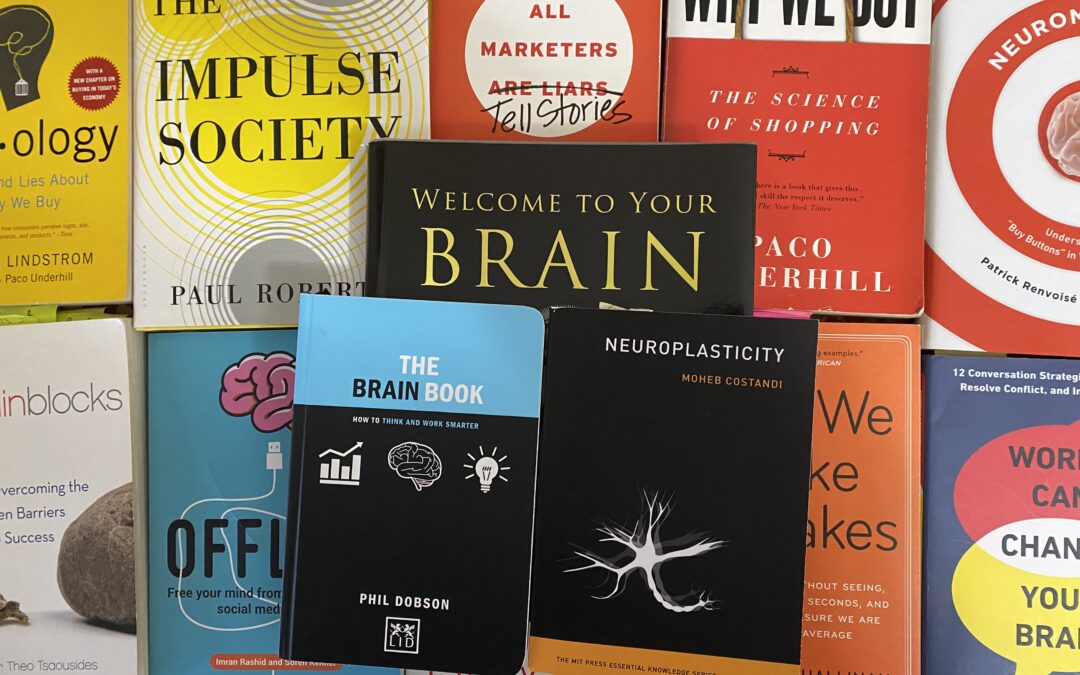Marketers, for one, are great fans of brain research, and books like Why We Buy, by Paco Underhill, Buy-ology by Martin Lindstrom, and How We Decide, by Jonah Lehrer give plenty of examples of how this knowledge is applied to increase sales. Expensive wine tastes better, but tests show that cheaper wine bearing high-priced labels taste better as well. Taste is in the brain.
When it comes to understanding the brain, there are a few non-brainers. For example, our brains are wired to be sociable. So, little contact between shoppers and employees results in lower sales. I think that’s a big one for me. I have often felt like an intruder walking into some stores and being completely ignored. Evidently that’s not unusual. Taco Underhill, in his book Why We Buy, says that 25% of the shoppers at a clothing chain never spoke a word to a salesperson.
Marketers know that your brain likes to conserve energy and takes the path of least resistance, which influences where items are positioned on display racks, shelves, and areas of the store. Amazon’s one-click purchasing is a good example of what marketers can do to make purchasing effortless. At the opposite extreme are retail outlets who encourage you to do the work of checking out your purchase. That’s why so many people, especially the elderly, balk at being trained to do the marketer’s job.
Because the brain likes to conserve energy, and decision-making burns it, another thing that must frustrate it is the variety of products offered. Too many choices complicate the decision-making process. When Procter & Gamble in the mid-1990s, for example, trimmed its 26 varieties of “Head and Shoulders” down to 15, eliminating the less popular ones. Sales jumped 10%. Golden Cat Corporation junked its 10 worst selling small-bag cat litter offerings and sales increased 12%.
With so many stores and other outlets for product sales, such as TV, radio, direct mail, and of course the Internet giants, like Amazon, marketers are focusing more on attracting customers away from other companies rather than developing new markets. Competition is greater than it has ever been. This requires a knowledge of how customers think, how they decide what and where to purchase. In other words, they must get into the customer’s brain.
For example, they know that words have the power to influence the way you act and think. There is even a book called Words Can Change Your Brain, by Newberg and Waldman. One example given in the book, is that “Negative words stimulate anxiety and positive words can lower it.” Studies show that the brain more readily picks up on negative words. No doubt that’s why we are always hearing negative news. You often read newspaper headings such as “Two killed in horrific crash” but seldom “72 people miraculously unhurt in factory explosion.” Bad news sells papers.
Our brain does not distinguish between what is real and what is imagined, and it reacts to positive and negative fantasies as though they were real. This applies to fear as well. Horror movie makers take advantage of this to make you react as though a real monster is jumping at you from the screen.
It`s also encouraging and motivational when you know you`re well on your way to getting something free. That`s why marketers offer free coffee or carwashes if you continue buying from them. With one or more spaces already punched to motivate prospects to continue. Neuromarketers have tested various vouchers for a car wash. One had 8 blank circles that had to be stamped before getting a free car wash. They made up another voucher with 10 circles instead of eight, but with 2 of them already stamped. This latter one was more effective. They were still required to purchase 8 car washes before receiving a free one, but two of the ten circles were already stamped so the customer was already a fifth of the way there! 34% used it for all 8 car washes compared to 19% of those using the one with only 8 blank circles. Why? Ask your brain.
Perhaps it’s because your brain is goal-oriented, and it has been tricked into thinking that since 2 spaces were already achieved, you were closer to your goal. But don’t fret. That’s just the quick-thinking, knee-jerk reaction of your core brain reacting, which might save your life someday. If you pause long enough to let the logical part of your brain, the prefrontal cortex, take over, you may react differently.
It’s the speed of life that allows marketers, scammers, and others to take advantage of you. Slow down. In the time it takes to smell the flowers, the CEO of your brain will take over. Blame it on the speed of life, not your brain.


Recent Comments